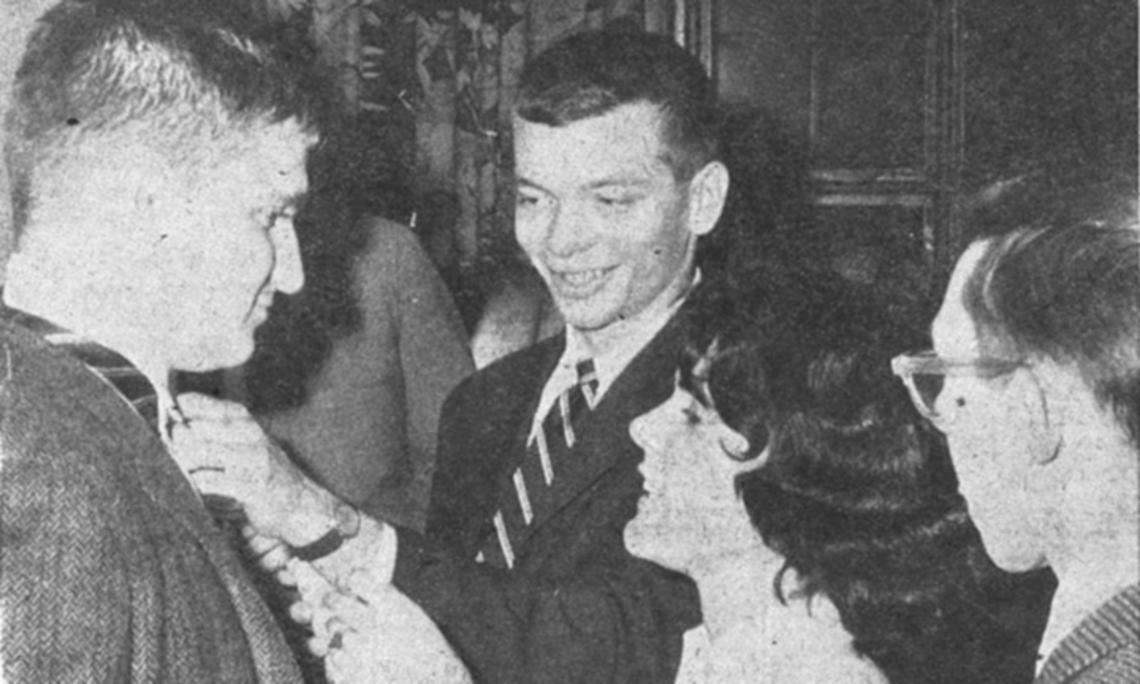
In February 1962, assistant professor of religion Arthur McGill was relatively new on campus who decided to dip a toe into one of Princeton’s most distinctive experiences: bicker. Observing the interactions of eating-club members and the sophomore bickerees, McGill told PAW that his first takeaway was “the absurdity in a club trying to digest 800 faces in one week.” He also remarked on the limits of brief social interactions. “I have noticed in precepts certain people who can hold a conversation for five minutes but then collapse,” McGill said, theorizing that bicker might be “the source of this five-minute mind.”
A few months later, McGill took part in another significant campus event, the Princeton Student Christian Association conference on “Integration: Conscience in Christ,” which included a sermon from the Rev. Martin Luther King Jr. McGill left Princeton for a new post at Harvard in 1968.
On the Campus: A Professor Bickers
By William A. McWhirter ’63
(From the Feb. 9, 1962, issue of PAW)
Last week, a 35-year-old religion professor with three children put on a club tie and joined the president of Colonial Club on the first night of Bicker. Arthur McGill, an assistant professor in the department for two years, drew only a few stares from the sophomores (one particularly hard look from Class President James Mitchell) and made a few pertinent observations to take back to his colleagues.
McGill, a small, owlish figure and an independent as an undergraduate at Harvard, decided to take on the class (he actually stayed through about eight rooms) after a dinner conversation with President Mike Paine.
“The faculty,” McGill grinned, “has a very strong feeling that Bicker wreaks havoc with the sophomores’ sensitivity and the seniors’ physiques. I just went into the process to test this somewhat. My overwhelming reaction toward the process is the absurdity in a club trying to digest 800 faces in one week. It is a simply inconceivable task. Here I see really the appalling contradiction between democracy and friendship, between universal niceness and personal commitment.
“The clubs, I mean, could just say that they could bid only the people they know or just let the dean’s office do it. I think the results would be much the same since the process is so haphazard. Another thing which surprised me was that the club also realized that the process was unreal. There was a certain preposterousness about it indicated in its gestures and comments.”
Although just along as an observer, McGill found himself following the standard grading procedure (1, 3, and 7). “I was absolutely fascinated by the variety of students,” he said. “I began rating them on the basis of their maturity, represented on a scale from 14 to 26 years old. The committee, I hasten to add, was not at all ready to adopt my criterion.”
Untroubled by the frequent complaint against snap judgments in Bicker, McGill admitted that “for me, the impression I had in 10 minutes could not be improved except over a period of a few weeks at least. That period was enough to grasp the social presence of the person. There is a danger, however, of operating only at the level of social presence. I have noticed in precepts certain people who can hold a conversation for five minutes but then collapse. One illuminating thing that I did discover was perhaps the source of this five-minute mind.”
Now through it, McGill offered the only statement about Bicker that anyone cares to make: “It’s certainly better than fraternity rushing. It’s not much, but it could hardly ever be much better.”










0 Responses